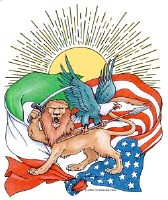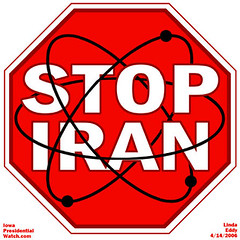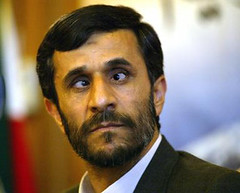Wednesday, January 17, 2007
US Stupidly Supplies Iran with War Material
Iran Gets Army Gear in Pentagon Sale
Jan 16, 2007 By SHARON THEIMER
The U.S. Military has sold forbidden equipment at least a half-dozen times to middlemen for countries - including Iran and China - who exploited security flaws in the Defense Department's surplus auctions.
The sales include fighter jet parts and missile components. In one case, federal investigators said, the contraband made it to Iran, a country President Bush branded part of an "axis of evil." In that instance, a Pakistani arms broker convicted of exporting U.S.Missile parts to Iran resumed business after his release from prison.
He purchased Chinook helicopter engine parts for Iran from a U.S. Company that had bought them in a Pentagon surplus sale.
Immigration and CustomsEnforcement agents, speaking on condition of anonymity, say those parts made it to Iran. The surplus sales can operate like a supermarket for arms dealers.
The Defense Reutilization and Marketing Service says on its Web site, calling itself "the place to obtain original U.S. Government surplus property." Federal investigators are increasingly anxious that Iran is within easy reach of a top priority on its shopping list: parts for the precious fleetof F-14 "Tomcat" fighter jets the United States let Iran buy in the 1970s when it was an ally.
In one case, convicted middlemen for Iran bought Tomcat parts from the Defense Department's surplus division. Customs agents confiscated them and returned them to the Pentagon, which sold them again - customs evidence tags still attached - to another buyer, a suspected broker for Iran.
That incident appalled even an expert on weaknesses in Pentagon surplus security controls. "That would be evidence of a significant breakdown, in my view, in controls and processes," said Greg Kutz, the Government Accountability Office's headof special investigations. "
A Defense Department official, Fred Baillie, said his agency followed Procedures. "The fact that those individuals chose to violate the law and the fact that the customs people caught them really indicates that the process is working, said Baillie, the Defense Logistics Agency's executive director ofdistribution. "
Customs is supposed to check all exports to make sure that all the appropriate certifications and licenses had been granted." The Pentagon recently retired its Tomcats and is shipping tens of thousands of spare parts to its surplus office - the Defense Reutilization andMarketing Service - where they could be sold in public auctions. Iran is the only other country flying F-14s."
It stands to reason Iran will be even more aggressive in seeking F-14 parts" said Stephen Bogni, head of Immigration and Customs Enforcement's arms export investigations. Iran can only produce about 15 percent of the parts itself, he said. Sensitive military surplus items are supposed to be demilitarized or de-milled" - rendered useless for military purposes - or, if auctioned, sold only to buyers who promise to obey U.S. Arms embargoes, export controls andother laws.
The GAO, the investigative arm of Congress, found it alarmingly easy to acquire sensitive surplus. Last year, its agents bought $1.1 million worth - including rocket launchers, body armor and surveillance antennas - by driving onto a base and posing as defense contractors. "They helped us load our van," Kutz said.
Investigators used a fake identityto access a surplus Web site operated by a Pentagon contractor and bought still more, including a dozen micro-circuits used on F-14 fighters. The undercover buyers received phone calls from the Defense Department asking why they had no Social Security number or credit history, but they deflected the questions by presenting a phony utility bill and claiming to be an identity theft victim.
The Pentagon's public surplus sales took in $57 million in fiscal 2005. The agency also moves extra supplies around within the government and gives surplus military gear such as weapons, armored personnel carriers and aircraft to state and local law enforcement.
Investigators have found the Pentagon's inventory and sales controls rife with errors. They say the sales are closely watched by friends and foes of the United States.
Among cases in which U.S. military technology made its way from surplus auctions to brokers for Iran, China and others: Items seized in December 2000 at a Bakersfield, Calif., warehouse that belonged to Multicore, described by U.S. prosecutors as a front company for Iran.
Among the weaponry it acquired were fighter jet and missile components including F-14 parts from Pentagon surplus sales, customs agents said. The surplus purchases were returned after two Multicore officers were sentenced to prison for weapons export violations.
London-based Multicore is now out of business, but customs continues to investigate whether U.S. companies sold military equipment to it illegally. In 2005, customs agents came upon the same surplus F-14 parts with the evidence labels still attached while investigating a different company suspected of serving as an Iranian front.
They seized the items again. They declined to provide details because the investigation is on-going. Arif Ali Durrani, a Pakistani, was convicted last year in California in the illegal export of weapons components to the United Arab Emirates, Malaysia and Belgium in 2004 and 2005 and sentenced to just over 12 years in prison.
Customs investigators say the items included Chinook helicopter engine parts for Iran that he bought from a U.S. company that acquired them from aPentagon surplus sale, and that those parts made it to Iran via Malaysia.
Durrani is appealing his conviction. An accomplice, former Naval intelligence officer George Budenz, pleaded guilty and was sentenced in July to a year in prison. Durrani's prison term is his second; he was convicted in 1987 of illegally exporting U.S. missile parts to Iran.
State Metal Industries, a Camden, N.J., company convicted in June of violating export laws over a shipment of AIM-7 Sparrow missile guidance parts it bought from Pentagon surplus in 2003 and sold to an entity partly owned by the Chinese government. The company pleaded guilty to an export violation, was fined $250,000 and placed on probation for three years.
Customs and Border Protection inspectors seized the parts - nearly 200 pieces of the guidance system for the Sparrow missile system - while inspecting cargo at a New Jersey port. "Our mistake was selling it for export," said William Robertson, State Metals attorney.
He said the company knew the material was going to China but didn't know the Chinese government partially owned the buyer.
In October, Ronald Wiseman, a longtime Pentagon surplus employee in the Middle East, pleaded guilty and was sentenced to 18 months in prison for stealing surplus military Humvees and selling them to a customer in Saudi Arabia from 1999 to 2002. An accomplice, fellow surplus employee GaydenWoodson, will be sentenced this month.
The Humvees were equipped for combat zones and some weren't recovered, Assistant U.S. Attorney Laura Ingersoll said.
A California company, All Ports, shipped hundreds of containers of U.S.military technology to China between 1994 and 1999, much of it acquired in Pentagon surplus sales, court documents show.
Customs agents discovered the sales in May 1999 when All Ports tried to ship to China components fo rguided missiles, bombs, the B-1 bomber and underwater mines. The company and its owners were convicted in 2000; an appeals court upheld the conviction in2002.
Rep. Christopher Shays, R-Conn., called the cases "a huge breakdown, an absolute, huge breakdown." "The military should not sell or give away any sensitive military equipment.
If we no longer need it, it needs to be destroyed - totally destroyed," said Shays, until this month the chairman of a House panel on national security.
The Department of Defense should not be supplying sensitive military equipment to our adversaries, our enemies, terrorists." It's no secret to defense experts that valuable technology can be found amid surplus scrap.
On a visit to a Defense Department surplus site about five years ago, defense consultant Randall Sweeney literally stumbled upon some items that clearly shouldn't have been up for sale. "I was walking through a pile of supposedly de-milled electrical items and found a heat-seeking missile warhead intact," Sweeney said, declining to identify the surplus location for security reasons.
"I carried it over and showed them. I said, "This shouldn't be in here." Sweeney, president of Defense and Aerospace International in West Palm Beach Fla., sees human error as a big problem.
Surplus items are numbered, and an error of a single digit can make sensitive technology improperly available and knowledgeable buyers could easily spot a valuable item, he said. "I'mnot the only sophisticated eye in the world," he said.
Baillie said the Pentagon is working to tighten security. Steps include setting up property centers to better identify surplus parts and employing people skilled at spotting sensitive items. If there is uncertainty about whether an item is safe, he said, it is destroyed.
Of the 76,000 parts for the F-14, 60 percent are "general hardware" such as nuts and bolts and can be sold to the public without restriction, Baillie said.
About 10,000 are unique to Tomcats and will be destroyed, he said. An additional 23,000 parts are valuable for military and commercial use and are being studied to see whether it's safe to sell them, Baillie said.
Asked why the Pentagon would sell any F-14 parts, given their value to Iran, Baillie said: "Our first priority truly is national security, and we take that very seriously. However, we have to balance that with our other requirement to be good stewards of the taxpayers' money."
Kutz, the government investigator, said surplus F-14 parts shouldn't be sold He believes Iran already has Tomcat parts from Pentagon surplus sales: "The key now is, going forward, to shut that down and not let it happen again."
Subscribe to:
Post Comments (Atom)














1 comment:
GARDUNEH MEHR ,you got to find some stronger words than treasonous,the AMERICAN and BRITISH created this monster terrorist regime in 1979 and they are just looking after their PRODUCT and what is wrong with that,this misery will end very soon once ANJOMANE PADESHAHI IRAN and FOOLADVAND demolish this western product by inside WARRIORS .
Post a Comment